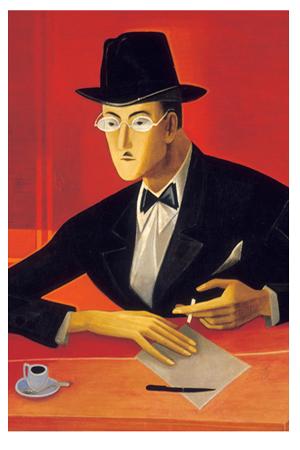|
FERNANDO PESSOA 1888-1935 |
Retrato de Fernando Pessoa por Almada Negreiros, óleo sobre tela, 1954 (pormenor) |
|
1888 |
Born on the 13th of June in the 4th floor of a building in the Largo de S. Carlos, Lisbon. |
|
1893 |
His father dies of tuberculosis at the age of 43. |
|
1895 |
His mother remarries, to the Portuguese consul in Durban, British colony of Natal, where the following year Pessoa will go and live. |
|
1901 |
Finishes secondary studies in Durban, enrolling the following year at the Commercial School. |
|
1903 |
Begins to write as Alexander Search, continuing to do so until 1910. |
|
1905 |
Returns to Lisbon by himself and enrolls in the Curso Superior de Letras,at the University, abandoning it in 1907. |
|
1908 |
Starts to work as foreign correspondent for commercial establishments. In September, he begins to write verse in Portuguese. |
|
1911 |
Refuses an offer from the English editor Warren Kellogg to move to England. |
|
1912 |
Publishes in the magazine A Águia three articles on «A nova poesia portuguesa», where he announces the «o próximo aparecimento do super-Camões» (the coming of a super-Camões). His correspondence with Sá-Carneiro begins. |
|
1913 |
Publishes, in A Águia, Na Floresta do Alheamento, a text which he indicates belongs to Livro do Desassossego. Meets Almada Negreiros. |
|
1914 |
Publishes, in the magazine A Renascença,the poem that will name the literary movement Paulismo. |
|
1915 |
Orpheu 1 and 2, are published, co-directed by Pessoa and Sá-Carneiro. |
|
1916 |
Publishes the paulic poem Hora Absurda, also «Ela canta, pobre ceifeira» and the fourteen sonnets Passos da Cruz. |
|
1917 |
Collaborated in Portugal Futurista, with Episódios, poems,and the Ultimatum by Álvaro de Campos. |
|
1918 |
Publishes two booklets in English, 35 Sonnets and Antinous. |
|
1919 |
Collaborates in Acção (Action), official organ of the Núcleo de Acção Nacional. |
|
1920 |
Moves to live with his mother and three half-siblings in Campo de Ourique. Exchanges love letters with Ofélia Queirós for nine months. |
|
1921 |
Creates the publishing firm Olisipo, where he publishes English Poems I-II (Antinous rewritten plus Inscriptions) and English Poems III (Epithalamium). |
|
1922 |
In the magazine Contemporânea he publishes O Banqueiro Anarquista and the twelve poems of Mar Português, that in 1934 will be part of Mensagem. |
|
1923 |
Prints and circulates two manifestos, one by Álvaro de Campos, Aviso por Causa da Moral, the other signed by him, Sobre um Manifesto de Estudantes, to defend his two friends António Botto and Raul Leal. |
|
1924 |
Athena. Revista de Arte, is launched, with Pessoa as literary director; its first issue reveals a heteronym, Ricardo Reis. |
|
1925 |
Pessoa reveals in Athena a new heteronym, Alberto Caeiro. |
|
1926 |
Collaborates in the six issues of the Revista de Comércio e Contabilidade (Magazine of Trade and Accounting). Answers a survey on the Portuguese Empire where he states that dominion over the colonies is not necessary. |
|
1927 |
The magazine Presença is launched in Coimbra; its issues will publish many texts by Pessoa and the modernists. |
|
1928 |
Publishes the booklet O Interregno. Defesa e Justificação da Ditadura Militar em Portugal, published by the Núcleo de Acção Nacional. |
|
1929 |
Bernardo Soares appears, signing two fragments of O Livro do Desassossego (The Book of Disquiet) in the magazine Solução Editora; Soares’ work will be published every year until 1932. |
|
1930 |
Pierre Hourcade publishes in the parisian magazine Contacts an article about the work of Fernando Pessoa. |
|
1932 |
Applies for the position of librarian in Cascais, but is not selected. Pierre Hourcade publishes four of his poems in the literary magazine Cahiers du Sud of Marseilles. |
|
1933 |
Publishes in Presença, among other works, the poem Tabacaria, by Campos. |
|
1934 |
Publishes on the 1st of December his only book of poems in Portuguese, Mensagem, which wins an official prize. |
|
1935 |
Dies on the 30th of November at the Hospital de S. Luís dos Franceses. |

